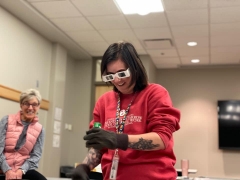Q. What drew you to a social work career?
A. I knew I wanted to be a therapist and began looking at different pathways to this in my undergraduate career. I chose social work because of the focus on social justice and the career options available to those with this degree. I am also excited by the fact that I am qualified and capable of multiple different types of careers.
Q. What advice would you have for someone who is interested in social work?
A. Your passion is so unique, and we need more helpers with the educational background to enact meaningful change. Obtaining a social work degree is a wonderful way to professionalize that passion and make you a better helper. Also, getting a degree in social work can open up a variety of career opportunities.








